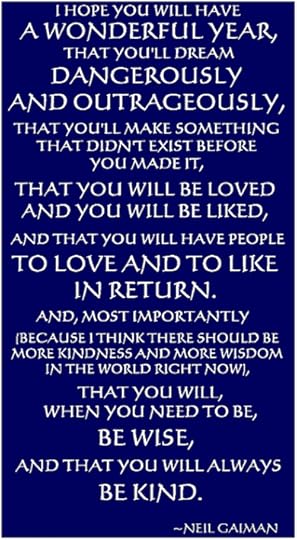Andrea Judy's Blog, page 9
January 29, 2013
Where do I begin?
One of the questions that seems to come up a lot with new writers is the age old debate about where to start the story. There are countless places to choose to begin the tale. You can drop the reader straight into the action and then explain the story, you can give them backstory, you can start many years ago, you can start at the end, and anywhere in between.
Just like there is no one right way to write, there is no one way to start a story. Each one requires something different.I, personally, do not much care for starting the story with back story, but it is becoming common (it has been a staple in fantasy for years) and can be very well done.
When people ask me about how to determine where to start a story, I always suggest the same thing: start at or just before the moment of change. Your character has been a farmhand for years and years, but then is found to be the heir of the king. In that situation, start your story either at the moment your character discovers the truth, or perhaps with the arrival of the person who will tell him the truth. This makes for a stronger start than an entire chapter of the character working on the farm, and gets the story moving immediately.
The opening is one of the most crucial parts of the story. Consider that you have one sentence to a paragraph to convince your reader that this book/story/poem is for them. Whether you start with an action or a scene or something else, you need to make it memorable. How is the best way to do that for your story?
Consider theses examples:
“The sky above the port was the color of television, tuned to a dead channel.” — William Gibson, Neuromancer
“It was a bright cold day in April, and the clocks were striking thirteen.” — George Orwell, 1984
“Whether I shall turn out to be the hero of my own life, or whether that station will be held by anybody else, these pages must show.” — Charles Dickens, David Copperfield
“I come from a family with a lot of dead people.” Each Little Bird That Sings by Deborah Wiles
“Many years later, as he faced the firing squad, Colonel Aureliano Buendía was to remember that distant afternoon when his father took him to discover ice.” One Hundred Years of Solitude, Gabriel García Márquez
“In a hole in the ground there lived a hobbit.” The Hobbit, J.R. R. Tolkein
“It was the day my grandmother exploded.” The Crow Road, Iain Banks
“Mother died today.” The Stranger, Albert Camus
These are all considered some of the greatest opening lines in Western Literature. They vary in tone, and how they open the story. Some start immediately with a bang or moment of change, some introduce the narrator or greet the reader, some describe the world of the story, but all of them hook you in.
The details are what make them stick. The first question makes you question, makes you curious about what is going to happen, and that moment is where the story should being.
Here’s one last quote to remember about finding the start of the story:
“A story has no beginning or end; arbitrarily one chooses that moment of experience from which to look back or from which to look ahead.” The End of the Affair, Graham Greene.


January 26, 2013
Submission Call!
One of my favorite publishers in the world is putting a call for several wonderful anthologies that I wanted to share for this short little Saturday post!
Luna’s Children: Tales of the Werewolf
Capes and Clockwork: Superheroes in the Age of Steam
I’m also very sad to remind everyone that duotrope now requires a $5/month subscription and I really recommend you get a subscription. It’s an amazingly useful site that has tons of submission calls for you.


January 22, 2013
Grounded in Reality
Settings have always been my weakness. I love epic fantasies, and science fiction stories but I struggle with coming up with settings that rival those epic places. The worlds that are built around the stories always leave me breathless. So I’ve started working to try and better focus on my settings.
One of the best ways I’ve found is to ground my setting in reality. Find a picture of a place that you like and imagine that is the background of your story. Now, this can work for just about any type of setting, the world is filled with some very strange and interesting places.
Working on an alien planet? Look at photos of the bottom of the ocean. Fantasy world? New Zealand has some beautiful locales to examine. You can also just look at the world around you. Remember that your reader is letting you create this world, so keep things grounded in reality and expand out from there.
Here are just a few amazing pictures of places from around the world!

Cenotes Caves in Mexico

Thor’s Well – “the gates of the dungeon.” CapePerpetua, Oregon.

Desert with Phacelia (Scorpion Weed)

Gryfino, Poland

Zhangye, Province of Gansu

New Zealand

Lena Pillars. Russia

Bottom of the Ocean

Tongariro Crossing
There is inspiration and magic to be found in the world all around us. Harness the magic in the real, and put the real in your magic to give the reader a sense of reality even when far away on Mars or in the ancient forests of a lost Elvin fortress.
January 19, 2013
Grammar like Roadsigns
My university held a great conference yesterday called New Voices (and it’s still going on today in downtown Atlanta if you’re interested. Details here.) and went to a panel about writing studios.
One of the presenters there, Helen, gave one of the best ways of explaining grammar that I’ve heard so I thought I would pass it along. In Atlanta we spend a lot of time in our cars because traffic is crazy, so this explanation worked well.
Imagine you’re driving down the road and suddenly all the signs disappear. There’s nothing telling you how fast to go, where to stop, where to turn, or even where you are. How do you get to your destination? Grammar works like those signs. It tells us where to slow down, what information is important, and where we should stop. It helps guide us safely to our destination.
Now, the analogy is not perfect, but I really thought it was one of the best ways to describe the role that grammar plays.


January 15, 2013
My Nemesis: The Outline
For many, many years I considered myself a proud pantser in that I needed no pre-planned plot. I flew by the seat of my pants into my story and let it lead me where it would. But then I started to crash and burn in my stories more and more. I would write myself into a corner, or suddenly realize that this was not at all where the story should have gone, and that I was maybe even focusing in on the wrong character and missing the story entirely.
But I still didn’t want to outline. ‘It’s too constraining. It takes away the creativity of the process, the magic of discovery! Blahblahblah!’ Then I began getting writing jobs that required me to send in an outline. The first time that happened I didn’t know what to do. What do they mean they want an outline? I haven’t written the story yet; I don’t know what happens!
Turns out that is not the right answer to a publisher.
So, after much trial and error, I was able to put together an outline and sent it off. The editor had some issue with it and sent it back and asked for a revision. I wailed and moaned again, and then shut up and did the revisions. I found that every time I reworked the outline, I liked the story more and more. I was getting a big picture view of the story before I dove in.
Now, I love outlines. Well, love might be a strong word… I enjoy the peace of mind that outlines give me. They help me see a problem in the plot before I’m even to that part in the story. I see that I can’t just plop in the villain sans introduction in the middle of Chapter 18. I enjoy the structure that outlines give me. For me, it’s something like being able to take an x-ray before surgery. It gives me a blueprint of what’s going on and what needs working on before I even enter into the body.
Now, that doesn’t mean that sometimes something still pops up when I’m elbow deep in the guts of the story, but I’ve got a better handle on how to fix it because I know where all the other pieces are. The outline doesn’t take away my creativity. I still get to wander through the story, figure out what’s happening and where the story is going, but this time I’m in control of the direction. I have the story on a leash and it is well behaved, not dragging me through the mud and bricks (well….it still does that…).
My outlines are usually vague. Sometimes bullet points of plot points, sometimes paragraph explanations, and sometimes, a combination of both. Find what works for you and go with it. Like almost everything else in writing, the only way to do it wrong is to do nothing.
Do you outline? Why or why not?


January 12, 2013
Maintaining Control
The internet is a wonderful and terrible land for a writer. On one hand, it makes it easier than ever to find and stay in contact with readers; it enables research to be done in hours instead of days, and it helps find advice with ease. But, it also serves as a dreadful time suck. You sign online for a legitimate purpose, to research what poison would have been used in an 18th century murder, and suddenly you’re reading about the French Revolution and 4 hours have passed.
When just starting out with trying to write every day, or to finish more work, it can be difficult to de-connect from the internet. I know it sounds silly, but the siren call of the internet can really be difficult to resist somedays. What if you get an e-mail? What if someone tweets you?
There are a lot of ways to deal with this. The easiest ones being 1) Go write somewhere that does not have internet or turn off your internet. 2) Write without a computer. There are a few other options as well
Freedom This software will block Internet access for up to 8 hours to keep you focused if you cannot help yourself (no shame)
Self Control This free app for Macs lets you choose specific sites to block for up to a full day. This is great if you get sucked into Facebook while writing, but still need to be able to do other research.
Rescue TIme This free software will track your internet usage and show you exactly how much time you are spending on individual categories. This can be a real eye-opener. (Fair warning, when I had this one installed Safari tended to freeze and crash)
Those are a few suggestions to help you get use to writing without the internet, but in the end, the follow-through is up to you! Disconnect and write!


January 8, 2013
Ego of the Writer
Writers are interesting characters. The ego of a writer is something that has always been particularly interesting to me. I’ve never been someone who was ever really boastful, or confident. I’ve always struggled with confidence in particular. It’s hard for me to sell myself or my work because I still doubt it, and doubt myself.
It’s something I’m working on, and have come a long ways. I can now actually say, ‘I am published.’ without immediately adding, ‘But only in a few small things. It’s nothing really.’ Baby steps, right?
For me, that line between confident and cocky is very difficult to find. Any time I find myself wanting to boast or brag, I instantly feel like a jerk. Like the kid in school who went on and on about how wonderful s/he was and would brag to the entire class about every 100 they made on every assignment. I never want to be like that, a cocky jerk, but I would like to be more confident in my writing and in my every day life. Especially now that I’m job hunting, I need all the confidence I can get! So, I thought I’d spend a little time explaining how I’m doing this.
1. Keep a list of your accomplishments.
Write down what you’ve done. You don’t have to share it with anyone if you don’t want to, but just the act of writing down what you’ve accomplished can really help put things in perspective! Also, have you noticed I like lists, yet?
2. Practice saying what you’ve done.
Stare in a mirror and introduce yourself. For me this has consisted of saying, ‘Hi. I’m Andi and I’m a writer.’ and then if I’m really feeling bold, I mention some of the things I’ve had published. Don’t giggle. Don’t lessen yourself. Practice until you can say it with a straight face.
3. Stop apologizing.
I have a bad habit of apologizing for things I have no reason to apologize for. I’ve sent the message, ‘Here’s my short story. Sorry if it’s too short!’ to an editor when I knew fully well that my story was exactly in the word length that had been requested. The apology was unneeded in any way, shape or form, but I still felt obligated to include it. Don’t lessen your work. Stop with the ‘Well, it’s a super rough draft…’ or ‘I wrote it in college so it’s probably not very good…’ Stand up for your work, be proud of what you’ve done and let it stand on its own. No apologies.
4. Focus on the good.
Instead of thinking about the things you don’t have, you haven’t done, etc. Think about all the things you do have, all the things you have done. Think about where you were 5 or 10 years ago and how much you’ve accomplished since then. Be proud of that.
5. Accept compliments.
If someone says, ‘Oh man, her work is great.’ Don’t laugh it off with a ‘Oh, really it’s not…’ as you shrink from the conversation. Smile, say ‘Thank you!’, be gracious and believe what you are being told.
And that’s how I’m trying to build my own little ego up. What ways have you found help you feel more confident as a writer or just in general? How do you manage the cocky/confident line?


January 5, 2013
Writing is a Journey
This past week I was fortunate enough to be able to reunite with one of my most beloved teachers from high school. She was the first teacher who really encouraged me to write, who believed and supported my writing. At the time I had written the first novel of a fantasy trilogy, and she was the first person besides my immediate friends that I let read it.
She was very kind, but did not sugar coat anything. She pushed me to do better, to write more, to read more. When I think back to the moment that I knew I wanted to be a writer, not just write for my friends, it’s her encouragement and words that always spring to mind. She pushed me to enter into writing contests, worked with me on my entries and because of her I won a few local competitions.
We lost touch after she left the high school I attended, and it’s been almost ten years since we spoke (Man, I feel old just thinking about that) but she happened to run into one of my friends from high school and exchanged e-mails with her. She passed along the e-mail and after a few ‘Hey, how are you?’ messages we agreed to meet for coffee.
It was a total blast from the past. It was good to see her doing so well, living happily, working on art and pursuing her own dreams. It was a reminder of where I started and how far I’ve come. Sometimes I get discouraged because I see all these stories of twenty-somethings with best-selling novels, agents, etc that I forget that writing is not (usually anyways) a quick and easy journey. You don’t just wake up with a best-selling novel written, edited and in the hands of the right publisher. It takes time, there are steps to the journey.
For now, I’m happy with where I am on the path, but I’ve still got a long ways to go, and that’s okay.
And I apologize if this post is rambly. I’m on an hour of sleep and more cough syrup than I’d like to fess up to taking.


January 1, 2013
Happy 2013!
I hope that you had a very Happy New Year’s Eve! I was lucky enough to be able to spend it with some of my best friends, laughing, and having a blast.
Now today is the first day of the New Year and they say that what you do today will set the tone for what you do for the rest of the year so make sure that you use the day wisely!
I leave you with a wish for the New Year from one of my favorite authors, Neil Gaiman.


December 30, 2012
2012 in review
The WordPress.com stats helper monkeys prepared a 2012 annual report for this blog.
Here’s an excerpt:
600 people reached the top of Mt. Everest in 2012. This blog got about 8,100 views in 2012. If every person who reached the top of Mt. Everest viewed this blog, it would have taken 14 years to get that many views.
Click here to see the complete report.









